
The First and Only Weekly Online Fanzine Devoted to the Life and Works of Edgar Rice Burroughs
Since 1996 ~ Over 15,000 Webpages in Archive
Volume 3294
Edgar Rice Burroughs: The War Years
Presents
THE ERB / GERMANY INCIDENT

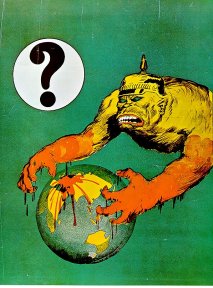 |
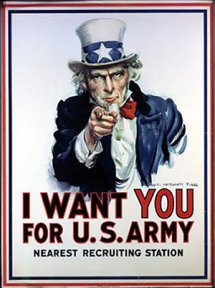 |
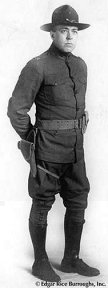 |
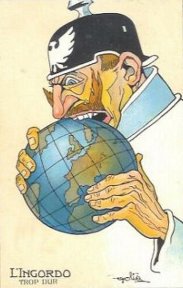 |
Edgar Rice Burroughs had a lifetime association with the US military and was a very patriotic American. He attended the Michigan Military Academy, first as a student and then as a geology professor and Gatling gun / riding instructor. When his application for West Point was unsuccessful he applied unsuccessfully for service with Teddy Roosevelt's Rough Riders and as a mercenary with the Chinese Army. When these applications were also unsuccessful he enlisted in the U.S. Army. When he requested to be posted to the army's toughest area he was sent to Arizona Territory. The young trooper served with the US 7th Cavalry (the "Bloody 7th" of Custer fame) from 1896 to 1897. See ERBzine 3469Years later, after America entered the Great War in 1917, he was anxious to serve in the war effort. Most of the American public where caught up in waves of patriotism and wartime fervor and the Burroughs family was no different. They all wanted to do their part in supporting their boys who were overseas and to do their part on the homefront. Brother Harry's wife, Nellie (Ella) and daughter, Evelyn took examinations for overseas service (Red Cross, YMCA, Knights of Columbus, etc.) They had been doing canteen work, Evelyn completed a course for overseas long distance telephony and become a fluent French conversationalist. Ed remarked, somewhat ironically: "I shall be very proud indeed when two of the lady members of the family are at the front and the men here in America."
Ed Burroughs was feeling frustration that he was too old to go into service to fight for his country. His age and family opposition prevented him from enlisting in the regular army, but he earned an appointment in the reserves as a result of his previous military service: Captain, Company A, Second Infantry. He was later promoted to major and to the command of the First Battalion, Second Infantry of the Illinois Reserves.
ERB also contributed to the war effort by writing a series of patriotic newspaper articles and working pro-American themes into various short stories and novels. The short story and novels he wrote during the war years - in the "heat of battle" so to speak -- into which he integrated patriotic or propaganda themes (depending on your interpretation) were: "The Little Door" | The Land that Time Forgot | Tarzan the Untamed. The articles are listed on this series' companion page at ERBzine 3298. .
Burroughs tested the fictional propaganda genre with "The Little Door" a short story that he wrote in November 17-23, 1917. In it he developed a theme of hatred and revenge against evil German army officers. Tthe French heroine lured a series of officers into a room where they were eaten by her pet lion. The story was rejected by numerous publishers who considered it too violent.
Undeterred, he carried on with the writing of The Land That Time Forgot that he had started in September. Again, German officers are the evil villains -- this time on a captured submarine where their treachery moves the plot along.
In May 1918, ERB made plans to write a Tarzan story based upon the campaign against the Germans in Africa. The influence of wartime anti-German propaganda upon him was even stronger and his belief in the atrocity reports led him to view the behaviour of the German army to be approaching subhuman. All his previous military training had inculcated the idea of a code of honour among warriors. Indeed, this morality played a major role in the developing of his fictional heroes up to that point. ERB's personal correspondence (October 1918) give some idea of his passionate feelings about the war. His letters indicate that his animosity was against the German military rather than the German people:
"It looks very much as though the filthy Hun would have to lie down and surrender within the next six months, but I think he will only do it after a complete and thorough licking, unless a gleam of intelligence manifests itself among the German people to the end that they rise up in their wrath and massacre the entire darned military class."These feelings carried over into his distrust and dislike of communism and in December of 1918 he submitted a plan to the Department of Justice in which he proposed to alert the public to the menace of communism by writing fiction showing what the world in the future would be like under Bolshevikism. The plan is rejected. This eventually led to his writing The Moon Maid.Considering America's anti-German feelings during the Great War, Ed's strong views against the German military were understandable. These strong patriotic feelings prompted him to write Tarzan the Untamed which was commenced in September 1918 under the working title, "Tarzan and the Huns." The plot involves a German army patrol which appeared to have murdered Tarzan's wife, Jane, and to have killed many of his loyal Waziri warriors and women, as well as having destroyed his African estate. A broken-hearted Tarzan went on a one-man war of vengeance against the German army as he tracked down those responsible for his wife's "death." This all seemed quite acceptable at the time and many books written during this difficult time expressed similar themes. In an attempt to cool ERB fervor a bit, his editor, Joseph Bray, suggested that the Germans actually had a pretty good record in Africa, but Ed was not one to dismiss such a good action story line. However, as future events would demonstrate, Ed made a mistake in not adopting Bray's more moderate attitude toward the Germans.
The piece of advice that ERB did heed, however, was in not having Jane actually killed off. . . apparently the charred body of the woman thought to have been Jane was actually that of one of her loyal servant girls.
ORIGINAL TEXT IN THE RED BOOK MAGAZINE VERSIONEd expressed his thoughts on being persuaded to resurrect Jane in a 1920 letter to his friend Bert Weston. On May 10, 1920, he wrote:
"Across the baby-grand piano lay the corpse of another black warrior while before the door of Lady Jane's boudoir were the dead bodies of three more of the faithful Greystoke servants.
"The door of this room was closed. With drooping shoulders and dull eyes Tarzan stood gazing dumbly at the insensate panel which hid from him what horrid secret he dared not even guess.
"Slowly, with leaden feet, he moved toward the door. Gropingly his hand reached for the knob. Thus he stood for another long minute, and then with a sudden gesture he straightened his giant frame, threw back his mighty shoulders and with fearless head held high, swung back the door and stepped across the threshold into the room which held for him the dearest memories and associations of his life. No change of expression crossed his grim and stern-set features as he strode across the room and stood beside the little couch and the inanimate form which lay face downward upon it, the still, silent thing that had once been Jane Clayton, Lady Greystoke. . . .
"For a long time he stood there gazing down upon the dead body of his mate, then he stooped and lifted her in his arms, and as he turned the body over and saw how horribly death had been meted to her, he plumbed, in that instant, the uttermost depths of grief and horror and hatred. . . .
In silence, in love and in reverence, he buried them in the little rose garden that had been her pride and her love -- the white and beautiful lady beside the great black warriors who had given their lives so futilely in her protection."REWRITE IN THE TEXT OF THE A.C. McCLURG 1st EDITION BOOK RELEASE
"For a long time he stood there just looking down upon the dead body, charred beyond recognition, and then he stooped and lifted it in his arms. . . .
"For a moment he had hoped against hope that the blackened corpse was not that of his mate, but when his eyes discovered and recognized the rings upon her fingers the last faint ray of hope forsook him.""... I left Jane dead up to the last gasp and then my publisher and the magazine editor rose up on their hind legs and roared. They said the public would not stand for it as I was having Tarzan fall in love with Bertha, so I had to resurrect the dear lady. After seeing Enid Markey take the part of Jane in the first Tarzan picture I was very glad to kill her."Burroughs was very appreciative of his success on the German market and realized that the anti-German references in Untamed and Land were somewhat of an embarrasment. He wrote his publisher:"I wish again to call your attention to the necessity for changes in the text of some of my stories for the German market. The Land That Time Forgot, for instance, is a story which I believe will be a big seller there. . . . as it was written during the height of hostilities it contains rather bitter diatribe aimed at Germans individually and collectively. As I do not write propaganda, and the sole aim of my work is to entertain, I believe it will be perfectly proper to fit the text to the public we wish to sell to."ERB biographer Porges pointed out some of the problems that Burroughs faced when choosing villains for his books:"In Burroughs' type of fiction a villain was a necessity; the various twists of the plot could not have been devised without one. His standard procedure was to create one, usually of foreign extraction, like the Russians Rokoff and Paulvitch or the Belgian Werper. But at an early period, with the increase of foreign editions of Tarzan, Burroughs himself had sensed the general problem that could arise. On January 11, 1921, to Enid Watson he had noted: 'In writing my Tarzan and Martian stories I always endeavored to avoid giving offense to any considerable proportion of my readers and therefore many of my villains were selected from the nations least likely to read my books. They were Russian, Swedish and Belgian, not because I harbor any particular dislike of these people but merely because few of my readers would be from these countries.'"A few years after the defeat of Germany in the war, although Untamed was not translated and published in Germany, rivals of Burroughs' German publisher obtained a Methuen edition from England. Prompted by strong backlash from various German writers who were more than a little jealous of the popularity of this American author and sales of his Tarzan books in their homeland this proved to be all that was needed to bring an end to the Burroughs publishing boom in Germany.Discovery of this book in England started a German media blitz against Burroughs and his books which sent Burroughs and his publisher into a panic. ERB responded with a letter explaining and defending his case. He explained that during the war he had been teased by Mrs. Burroughs because the Kaiser had been one of his most admired heroes. Ed wrote,
". . . even as late as the time I wrote The War Lord of Mars, the influence of my admiration for the German Emperor had a great deal to do with the stimulation of my imagination in the conception of that story. The war shattered a great many things, however, from thrones to ideals."He recalled the post-American Civil War bitterness that had existed between the North and the South had gradually disappeared over the years . . . as would the animosities created by WWI. He explained the controversial passages in his two WWI novels:"They reflect truly what I thought and felt at the time that I wrote them and because this is a fact I cannot apologize for an honest conviction however mistaken it may have been."He also observed that the villains he had created "were the types that the German people themselves have inveighed most bitterly against . . . the cruel, ruthless, arrogant German officer." He explained that villains in his books had been of many nationalities, including American:". . . I have no hesitancy in offending those whom I consider a menace to society regardless of their nationality or of their purchasing power . . . if I should never sell another book in Germany I should still be as bitterly antagonistic toward Hauptman Fritz Schneider, as all my German friends in this country are and as the vast majority of the German people in Germany are and, I hope, always will be."He felt it important that the pleasure that so many German readers had derived from his books shouldn't "lessened" because a foreign writer attacked a "conscienceless militarism that is to be found among certain classes in every great power in the world."He also made the point that he had a German brother-in-law, a native of Hamburg, whose two daughters had recently been guests at the Burroughs' home in Los Angeles, and that he had a great many friends with German roots and ties. . . and that none of them had been offended by his books. He also wrote that:
"I hope to visit Germany next year and I have no doubts whatsoever as to the kindliness and cordiality of my reception, which would not be the case if I believed that Hauptman Fritz Schneider was typical of even a negligible minority of the German people."Ed's letter had little effect and the bitter attack from the German press continued - indignantly appealing to nationalistic pride. These attacks served to present Burroughs as a representative of all the foreign powers that had defeated and humiliated the German nation and left the country in dire financial straits. These strong emotions had been further fanned by the country's mistrust of the newly installed government and theturmoil created by the rising power of Adolph Hitler's Nazi party. Burroughs was an obvious scapegoat for all these ills. The following translation from a German press retort is typical of the stream of vitriolic attacks on Burroughs:"We have learned much out of the war and who were our former foreign friends. We were not prepared, however, to learn to like the silly admiration for their outlandish literary compositions and which are of so inferior worth and such a lash in our face. It is not otherwise possible that a greater calumny of the German reading public (or insult to the German reading public) could be written than the Tarzan Romance and which is itself such a miserable "Schmierwerk" (botch job)... ."In 1925 a scathing anti-Burroughs publication by German author Stefan Sorel (Carl Stephenson) did irreparable damage to Burroughs' character and book sales in Germany. Sorel/Stephanson is probably best known for his 1938 short story "Leiningen Versus the Ants". It was adapted into a 1948 radio play later to the screen as The Naked Jungle (1954). Sorel's Tarzan the German-Devourer (Tarzan der Deutschenfresser) aroused indignation and anger among Germans, especialy since it was inferred that this was ERB's most recent book, written seven years after the war.A book review of Sorel's "German-Devourer" comments that the great masses of readers who "became victims" of the Tarzan reading fever exhibited poor taste and judgment.
"This 'romantic journey' which increased with as much rapidity as the prolificacy of rabbits represents the greatest piece of stupidity ever thrown on the book market. The author of this 'colportage series,' (referred to as "Mr. Rice Burroughs") is one of the basest German-devourers existing in the Anglo-Saxon countries."It became obvious to insiders that jealous rival writers and publishers were behind the press assault on Burroughs in successful attempt to destroy the sales market for Tarzan books. ERB's publisher wrote:". . . my personal opinion is that this is based not so much on the anti-German attitude as expressed in `Tarzan the Untamed' but on the jealousy evinced by a certain section of the German press (and not a very important section) at the success of a foreign book in their own country."Ed gave a last ditch appeal to the German press in an attempt to salvage what he could from the German market:"I fully understand the very natural resentment that this story has aroused in Germany . . . As a matter of fairness, however, to myself and Mr. Charles Dieck, my German publisher . . . Tarzan the Untamed was written during the heat of an extremely bitter war and not six years later as claimed, nor was it written for German readers. . . . But perhaps my publisher's success has been his undoing in the jealousy that it has aroused. . . . If I have been stupid in not realizing the harm that Tarzan the Untamed might do, I have at least tried to remedy the wrong by instructing my publishers and agents to withdraw the book from circulation as rapidly as possible throughout the world and never offer it again. . . . the war has been over a long time. None but the most mercenary or shortsighted would lend themselves in any way to the rekindling of national animosity. This is a matter of deepest regret to me, for I really am not half the terrible creature that the German press seems to think of me. . . ."This letter apparently accomplished little with the German press. The Frankfurter Zeitung responded with an article titled MR. BURROUGHS OPENLY CONFESSES, in which they acknowledged his letter:". . . his regret that his book may have hurt German readers, but that it originated during the war and that excuses a great deal. Mr. Burroughs worte his books for one purpose: TO ENTERTAIN. He did not want to offend and the book is really not written for Germans. The ingenuousness of this confession is disarming for there certainly is more pleasing material for entertainment than the cruelties of German officers in Africa. . . . We are glad that he acknowledges it. Unfortunately though this realization comes a little belated. . . ."Ed, feeling that he had made a "fair and reasonable" effort at conciliation, refused to "assume a spineless attitude and retract and apologize ad nauseum." and agreed that". . . the attitude of the German press has nothing whatsoever to do with patriotism or injured German sensibilities, but is quite evidently prompted by jealousy of German publishers who did not have the business foresight and sense of values possessed by Mr. Dieck."He had lost patience and felt that if the press persisted in doubting his explanation that he would gain more respect if he told them "that they might go to hell."
Burroughs' problems with Germany would flare up again eight years later, soon after Hitler had taken over as Chancellor. Fired up mobs of the new Third Reich culminated their parades with book burnings. ERB's books were among the thousands of torched books that included titles by Einstein, Freud, H.G. Wells, Jack London, Upton Sinclair, etc. Strong censorship was also imposed on the press and the film industry. In March 1934, the Berlin Film Control Board banned Tarzan of the Apes since it was deemed "dangerous to Nazi principles of race-consciousness and offensive to Nazi ideals of matrimony and womanly dignity (a foreshadowing of the banning of Tarzan books by a librarian in the United States 30 years later -- an event that ironically brought about the Burroughs publishing boom of the '60s).The reasons given for the banning of Tarzan films included:
"A picture which places mere instincts in the foreground and which has a tendency to argue that a jungle man, even amonkey, is capable of the noblest sentiments and is worthy to be a partner in matrimony, is in contradicdtion to the repopulation policy and the tendencies of National Socialism.This Edgar Rice Burroughs was obviously considered a major threat to the morals and high ideals held by Hitler's Nazi party who felt his books and films were "liable to excite sadistic sentiments in the spectators.""In its effects, the picture works against the official propaganda and enlightenment in this sphere, even if the naive spectator should not realize it immediately. . . . The picture is liable to hurt the sense of race and to work against the government's efforts on behalf of enlightenment. It is of vital importance for the state to uphold a vital sense of race."
The following Web pages (ERBzine 3295, ERBzine 3296 and ERBzine 3297) feature the translation of Sorel's Tarzan the German-Devourer (Tarzan der Deutschenfresser) by Wendayne (Wendy) Wahrman (1912–1990) wife of famous SF and Fantasy personality Forry Ackerman. The translation had been commissioned by Darrell Richardson and the original manuscript is on file at the McWhorter Memorial Edgar Rice Burroughs Collection at the University of Louisville, Louisville, Kentucky, USA.

Reference Sources are listed in Part IV of this series in:
ERBzine 3298
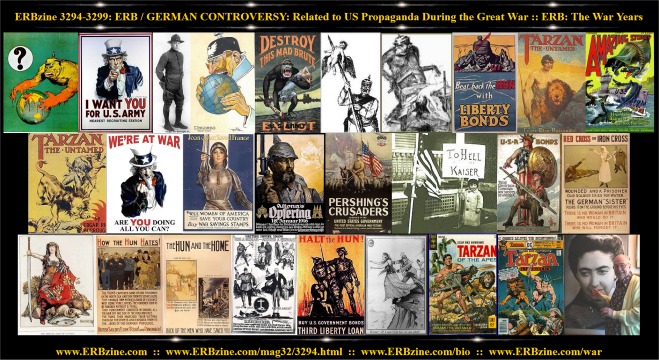
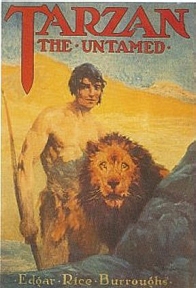

BILL
HILLMAN
Visit
our thousands of other sites at:
BILL
AND SUE-ON HILLMAN ECLECTIC STUDIO
All
ERB Images© and Tarzan® are Copyright ERB, Inc.- All Rights Reserved.
All
Original Work © 1996-2011/2018 by Bill Hillman and/or Contributing
Authors/Owners
No
part of this web site may be reproduced without permission from the respective
owners.